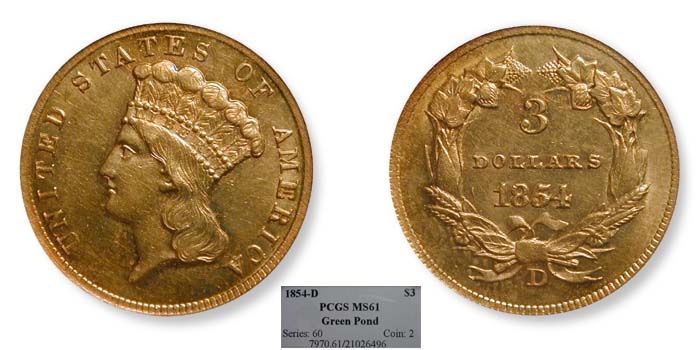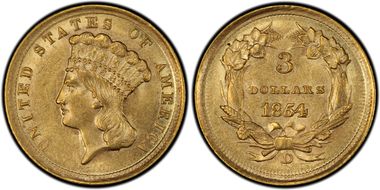1854-D $3 MS61 认证号21026496, PCGS号7970
专家评论
David Akers (1975/88)
This is the only three dollar gold piece struck at the Dahlonega mint. It is undeniably one of the rarest in the series, ranking 12th in rarity according to number of appearances in our 238 catalogue auction survey and 6th according to rarity by average grade. All specimens that I have seen are very poorly struck with very little hair on the headdress detail and weak or missing denticles. The milling is also characteristically weak in places, particularly at twelve o'clock on the obverse. The effect is similar to when a loop has been removed but this weakness is present on every specimen I have encountered. Like the 1854, the 1854-D had small letters in the word DOLLARS. The mintmark is always unusually bold. Specimens of this date are usually grossly overgraded, partly because the date is a very rare one, but also because they are just hard to grade and the tendency with most auctioneers is to be optimistic when there is a doubt. I have seen several AU pieces but never an unequivocally mint state one. Even strictly graded EF specimens are very rare.Doug Winter
The 1854-D three dollar gold piece is an extremely popular issue due to the fact that it is the only date of this denomination which was struck at the Dahlonega Mint. With a tiny mintage of 1,120 coins it is rare. But, it is more available than generally acknowledged, especially in lower grades.The 1854-D three dollar gold piece is a scarce and popular issue which is most often seen in Very Fine and low end Extremely Fine grades. It becomes very scarce in properly graded Extremely Fine-45 and it is a rare coin in About Uncirculated. It is very rare at the About Uncirculated-55 level and it is currently extremely rare in full Mint State.
STRIKE: The strike on the 1854-D three dollar gold piece is extremely distinctive. In fact, it is easy to identify this issue just by seeing the obverse. The overall quality of strike is soft. On the obverse, the hair detail is fairly good but there is always some softness. The plumes in the bonnet, the hair above the ear and the hair covering Liberty’s neck often show weakness. The border is much softer than the center. The U in UNITED is always weak while TED in this word is heavy and doubled. The denticles from 7:00 to 3:00 are so weak as to appear non-existent. The entire upper part of the rim has a very flat appearance. The reverse center is sharp with the wreath showing good overall detail. The denticles are almost always very weak and they can usually be seen only from the 3:00 to 8:00 area with the rest of the border appearing very flat.
At least two 1854-D three dollar gold pieces are known which show nearly full denticles. These coins are in the Bill House and Harry Bass collections and they may represent among the very first examples struck.
There are other important diagnostic characteristics for this issue as well. On the obverse, there is always a prominent clashmark at the throat of Liberty and another directly behind the headdress. On the reverse, there are clashmarks in the wreath. The right bow knot is separated as the result of die polish as is the leaf to the left of the 1 in the date. These are found on all genuine examples; even pieces which are very well worn.
SURFACES: Most 1854-D three dollar gold pieces have below average quality surfaces. It is very common to see pieces which have extensive abrasions and many coins have mint-made defects such as black grease stains, planchet roughness or laminations. A significant number of 1854-D three dollar gold pieces have been cleaned at one time and now show hairlines on their surfaces.
LUSTER: The typical piece shows enough wear that there is very little luster present. On high grade examples, the luster tends to be soft and satiny. It is inferior to that seen on comparably dated Philadelphia coins of this denomination.
COLORATION: Uncleaned, original 1854-D three dollar gold pieces are most often a medium to deep green-gold hue. At one time it was not hard to locate an example that had nice color. Today, nearly all the available pieces have been cleaned or dipped.
EYE APPEAL: Due to its very distinctive strike characteristics, this issue seldom has good eye appeal. A few very pleasing original Extremely Fine and About Uncirculated pieces exist and these command a strong premium over the typical low end coin which is offered for sale.
PERSONAL OBSERVATIONS: Nearly every 1854-D three dollar gold piece that I have seen in the past five years has been cleaned or dipped and most have been very liberally graded by the two major services (which is no real surprise given the popularity of this issue). Any piece that is clean and original is very desirable.
The level of demand for this coin remains extremely strong. If I had the financial resources (and patience) I would attempt to warehouse a number of nice quality 1854-D three dollar gold pieces and wait for the market to come to me.
DIE VARIETIES: Only one die variety is known.
Variety 1-A: On the reverse, the date is low and even. The 5 and the 4 touch. The mintmark is large and high with a slight downward tilt to the right. It appears that the mintmark is the same as one used on one of the 1854-D half eagle varieties.
NOTE: A number of examples of this date have been repaired. This usually involves fixing rim damage. It may also include the edges showing re-engraving on the reeding. It is very important for the collector to only purchase 1854-D three dollar gold pieces which have been certified by a reputable third party grading service or from a knowledgeable specialist in the field of southern gold coinage.
PCGS #
7970
设计师
James Barton Longacre
边缘
Reeded
直径
20.50 毫米
重量
5.02 克
铸币数量
1120
金属成分
90% Gold, 10% Copper
更高评级数量
1
评级较低的钱币数量
141
地区
The United States of America
价格指南
PCGS 数量报告
拍卖 - PCGS 评级的
拍卖 - NGC 评级的
稀有性和存量估计 了解更多
| 所有评级 | 300 |
| 60或以上 | 12 |
| 65或以上 | 0 |
| 所有评级 | R-6.4 |
| 60或以上 | R-9.5 |
| 65或以上 | R-10.1 |
| 所有评级 | 5 / 41 TIE |
| 60或以上 | 4 / 41 TIE |
| 65或以上 | 1 / 41 |
| 所有评级 | 5 / 41 TIE |
| 60或以上 | 4 / 41 TIE |
| 65或以上 | 1 / 41 |






















